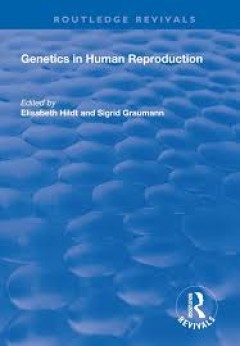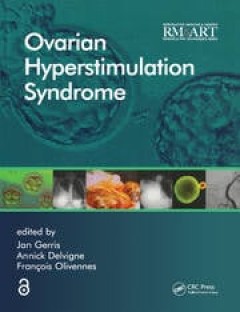Filter by

Genetics in human reproduction
ABSTRACT Published in 1999, this book discusses issues related to the current and possible future technological progress in genetic technology linked to in vitro fertilization, specifically preimplantation diagnosis and germline gene therapy, from a scientific and medical as well as from a social, juridical and ethical point of view. The 31 contributions are divided into six sections medical a…
- Edition
- -
- ISBN/ISSN
- 9780429456619
- Collation
- 336 p
- Series Title
- -
- Call Number
- -

Developing modern livestock production in tropical countries: proceedings of …
Animal production Animal nutritionAnimal reproduction and breedingAnimal product and agribusinessLivestock engineering
- Edition
- -
- ISBN/ISSN
- 9781003370048
- Collation
- -
- Series Title
- -
- Call Number
- -

IAEA Atlas of Cardiac PET/CT
This open access book presents a wide portfolio of examples of positron emission tomography coupled with computer tomography (PET/CT) studies in various cardiac conditions in order to provide a rationale for the implementation of this technology in an array of clinical conditions. Cardiovascular diseases are a major contributor to premature morbidity and mortality worldwide. Low- and middle…
- Edition
- 1
- ISBN/ISSN
- -
- Collation
- -
- Series Title
- -
- Call Number
- IX, 207

Assessment of Cancer Screening
Cancer screening is a prominent strategy in cancer control in the United States, yet the ability to correctly interpret cancer screening data eludes many researchers, clinicians, and policy makers. This open access primer rectifies that situation by teaching readers, in simple language and with straightforward examples, why and how the population-level cancer burden changes when screening is im…
- Edition
- 1
- ISBN/ISSN
- -
- Collation
- -
- Series Title
- -
- Call Number
- XX, 123

Krankenhaus-Report 2022
Der Krankenhaus-Report, der jährlich als Buch und als Open-Access-Publikation erscheint, greift 2022 das Schwerpunktthema „Patientenversorgung während der Pandemie“ auf. Die Auswirkungen der Covid-19-Pandemie haben auch 2021 die Diskussionen zur stationären Versorgung zentral geprägt. Im Fokus stehen weiterhin Fragen rund um die Versorgung von Erkrankten mit und ohne Covid-19 sowi…
- Edition
- 1
- ISBN/ISSN
- -
- Collation
- -
- Series Title
- -
- Call Number
- XXIII, 430

Cancer in the Arab World
This is an Open Access book. This book is a must-have for healthcare providers and researchers, public health specialists and policy makers who are interested and involved in cancer care in the Arab world. The Arab world consists of 22 countries, which are members of the Arab League and spanning over 13,132,327 km2 with over 423,000,000 population. Over the past few decades, the Arab world…
- Edition
- 1
- ISBN/ISSN
- -
- Collation
- -
- Series Title
- -
- Call Number
- XV, 476

Vitalism and Its Legacy in Twentieth Century Life Sciences and Philosophy
This Open Access book combines philosophical and historical analysis of various forms of alternatives to mechanism and mechanistic explanation, focusing on the 19th century to the present. It addresses vitalism, organicism and responses to materialism and its relevance to current biological science. In doing so, it promotes dialogue and discussion about the historical and philosophical importan…
- Edition
- 1
- ISBN/ISSN
- -
- Collation
- -
- Series Title
- History, Philosophy and Theory of the Life Sciences
- Call Number
- VIII, 269

Ovarian hyperstimulation syndrome
ABSTRACT Major advances have recently been made in our understanding of Ovarian Hyperstimulation Syndrome (OHSS). These include improving classification, recognizing primary and secondary risk factors, manipulating and monitoring ovarian stimulation, handling risky situations, and elucidating the underlying pathophysiologic mechanisms of the syndrome. As su
- Edition
- -
- ISBN/ISSN
- 9780429095405
- Collation
- 320 p
- Series Title
- -
- Call Number
- 610 OVA

The Self-Directed Learner in Medical Education : the Three Pillar Model of Se…
Self-directed learning is perhaps the Holy Grail of adult learning and for good reason. Within this seemingly simple phrase lies the battleground for the frustrations of both educator and learner as they work through the difficulties of an unequal and sometimes intense partnership
- Edition
- -
- ISBN/ISSN
- 9780429091926
- Collation
- 248 p
- Series Title
- -
- Call Number
- 610 GAV s

Quality Management and Accreditation in Hematopoietic Stem Cell Transplantati…
This open access book provides a concise yet comprehensive overview on how to build a quality management program for hematopoietic stem cell transplantation (HSCT) and cellular therapy. The text reviews all the essential steps and elements necessary for establishing a quality management program and achieving accreditation in HSCT and cellular therapy. Specific areas of focus include document de…
- Edition
- -
- ISBN/ISSN
- 978-3-030-64492-5
- Collation
- -
- Series Title
- -
- Call Number
- -
 Computer Science, Information & General Works
Computer Science, Information & General Works  Philosophy & Psychology
Philosophy & Psychology  Religion
Religion  Social Sciences
Social Sciences  Language
Language  Pure Science
Pure Science  Applied Sciences
Applied Sciences  Art & Recreation
Art & Recreation  Literature
Literature  History & Geography
History & Geography